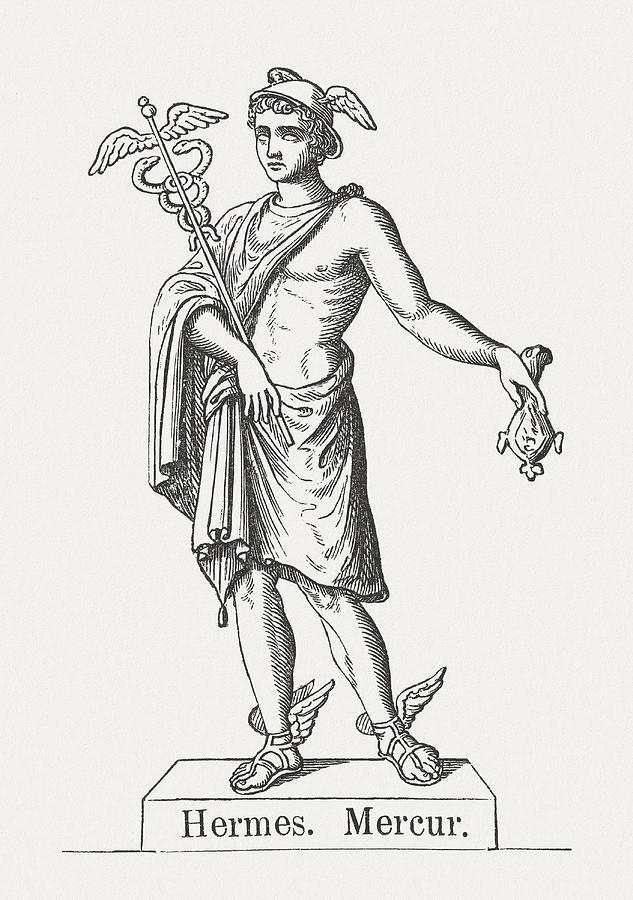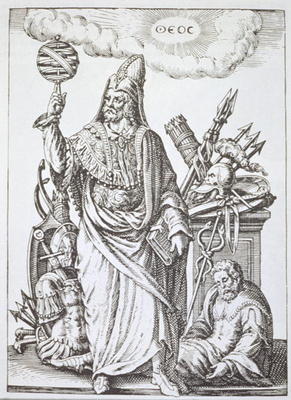Read this concise article to know more about Hermetic School of Thought.
Click here if you would like to see more articles.
I. Introduction
Hermetic Philosophy, a mystical and esoteric tradition, is believed to have originated from the teachings of Hermes Trismegistus, a legendary figure often associated with the Egyptian god Thoth and the Greek god Hermes. This ancient wisdom encompasses a wide range of spiritual, philosophical, and alchemical knowledge that has profoundly influenced Western thought. Hermetic Philosophy is based on the principle that there is a universal truth that underlies all religions and philosophies, offering a holistic understanding of the cosmos and our place within it.
In this blog post, we aim to explore the rich heritage of Hermetic Philosophy, unraveling its core principles, historical context, and practical applications. Whether you are new to esoteric studies or an experienced seeker of wisdom, this guide will provide valuable insights into the timeless teachings of Hermes Trismegistus. By the end of this journey, you will have a deeper appreciation of Hermetic thought and how it can be applied to enhance your personal and spiritual growth.
II. Historical Context
The origins of Hermetic Philosophy can be traced back to ancient Egypt and Greece, where it was believed that Hermes Trismegistus imparted his divine wisdom. The teachings were eventually compiled into texts known as the Corpus Hermeticum, a collection of writings that form the foundation of Hermetic thought. These texts, along with other significant works like The Kybalion, have been revered for centuries and continue to be studied for their profound insights into the nature of reality.
Understanding the historical context of Hermetic Philosophy is crucial for appreciating its depth and significance. The blend of Egyptian, Greek, and later, Christian and Islamic influences, created a unique philosophical tradition that bridges ancient and modern wisdom. By exploring the cultural and historical background of Hermeticism, we gain a better understanding of its development and enduring impact on Western esotericism and spirituality.
- Origins in ancient Egypt and Greece.
- The role of Hermes Trismegistus.
- Key texts: Corpus Hermeticum and The Kybalion.
- Influence of Egyptian, Greek, Christian, and Islamic traditions.
- Development and enduring impact on Western thought.
III. The Core Principles of Hermetic Philosophy
Hermetic Philosophy is built upon seven fundamental principles that serve as the cornerstone of its teachings. The first principle, Mentalism, posits that the universe is a mental creation, emphasizing the power of the mind in shaping reality. The principle of Correspondence, often summarized by the phrase “As above, so below,” highlights the interconnectedness of all levels of existence, from the microcosm to the macrocosm.
The principle of Vibration asserts that everything in the universe is in constant motion, while Polarity explores the dual nature of reality, where opposites are interconnected. Rhythm describes the natural cycles and patterns that govern all aspects of life, and Cause and Effect emphasizes the law of causation, where every action has a corresponding reaction. Finally, the principle of Gender reveals the presence of masculine and feminine energies in all things. These principles collectively offer a comprehensive framework for understanding the universe and our place within it.
- Mentalism: The universe as a mental creation.
- Correspondence: Interconnectedness of all levels of existence.
- Vibration: Constant motion in the universe.
- Polarity: Dual nature of reality.
- Rhythm, Cause and Effect, and Gender: Natural laws and energies.
IV. Practical Applications of Hermetic Teachings
The principles of Hermetic Philosophy are not just theoretical concepts; they offer practical guidance for personal and spiritual development. By understanding and applying these principles, individuals can enhance their mental and emotional well-being, gain greater control over their lives, and align themselves with the natural order of the universe. For instance, the principle of Mentalism encourages positive thinking and visualization techniques to manifest desired outcomes.
The principle of Correspondence can help individuals recognize patterns and relationships in their lives, facilitating better decision-making and problem-solving. Embracing the principle of Vibration allows for greater adaptability and resilience, while understanding Polarity helps in achieving balance and harmony. By applying the principles of Rhythm, Cause and Effect, and Gender, one can navigate life’s challenges with grace and wisdom, fostering personal growth and spiritual enlightenment.
- Practical guidance for personal and spiritual development.
- Enhancing mental and emotional well-being through Mentalism.
- Recognizing patterns and relationships with Correspondence.
- Achieving balance and harmony through Polarity.
- Navigating life’s challenges with Rhythm, Cause and Effect, and Gender.
V. Influence and Legacy
Hermetic Philosophy has had a profound influence on Western esotericism, inspiring various movements and individuals throughout history. The Renaissance period, in particular, saw a resurgence of interest in Hermetic thought, as scholars sought to integrate its teachings with contemporary scientific and philosophical developments. This period of intellectual and cultural revival helped solidify the importance of Hermeticism in the Western tradition.
In modern times, Hermetic principles continue to inspire spiritual seekers, artists, and thinkers. From the works of influential figures like Carl Jung to contemporary spiritual movements, the legacy of Hermetic Philosophy endures. Its teachings have also permeated popular culture, with references found in literature, film, and art, showcasing the timeless relevance and appeal of Hermetic wisdom.
- Influence on Western esotericism and Renaissance thought.
- Integration with scientific and philosophical developments.
- Enduring inspiration for modern spiritual seekers.
- Impact on influential figures like Carl Jung.
- Presence in contemporary literature, film, and art.
VI. Misconceptions and Clarifications
Despite its profound teachings, Hermetic Philosophy is often misunderstood or misrepresented. One common misconception is that Hermeticism is synonymous with occultism or magic, which can obscure its true philosophical and spiritual nature. While Hermeticism does encompass esoteric knowledge, its primary focus is on the principles that govern the universe and the pursuit of wisdom.
Another misunderstanding is the conflation of Hermeticism with other esoteric traditions, such as Gnosticism or Alchemy. While there are overlaps, Hermetic Philosophy has its own distinct principles and teachings. Clarifying these misconceptions is essential for a genuine understanding of Hermeticism, allowing individuals to appreciate its unique contributions to spiritual and philosophical thought.
- Misconception: Hermeticism as synonymous with occultism.
- True focus on universal principles and wisdom.
- Distinction from other esoteric traditions like Gnosticism and Alchemy.
- Importance of clarifying misconceptions for genuine understanding.
- Appreciation of Hermeticism’s unique contributions.
VII. Further Reading and Resources
For those interested in exploring Hermetic Philosophy further, there are numerous resources available that offer in-depth insights and analyses. Key texts include the Corpus Hermeticum and The Kybalion, both of which provide foundational knowledge of Hermetic teachings. Modern translations and commentaries, such as those by Hermes Trismegistus and the Three Initiates, offer accessible interpretations for contemporary readers.
In addition to books, various online resources, academic articles, and courses can deepen your understanding of Hermetic thought. Engaging with these materials will enhance your appreciation of the profound wisdom contained within Hermetic Philosophy and provide practical guidance for applying its principles to your life.
- Recommended key texts: Corpus Hermeticum and The Kybalion.
- Modern translations and commentaries.
- Online resources, academic articles, and courses.
- Enhancing understanding through diverse materials.
- Practical guidance for applying Hermetic principles.
VIII. Conclusion
In conclusion, Hermetic Philosophy offers a timeless framework for understanding the universe and our place within it. Its principles, derived from the teachings of Hermes Trismegistus, provide profound insights into the nature of reality and practical guidance for personal and spiritual growth. By exploring the rich heritage of Hermetic thought, we can gain a deeper appreciation of its enduring wisdom and relevance.
We encourage readers to delve into Hermetic Philosophy, apply its teachings in their daily lives, and continue their journey of self-discovery and enlightenment. The timeless truths contained within Hermeticism have the power to transform your understanding of reality and unlock new dimensions of personal and spiritual fulfillment.
- Recap of Hermetic Philosophy’s significance.
- Timeless relevance of its principles.
- Encouragement to explore and apply Hermetic teachings.
- Invitation for continued self-discovery and enlightenment.
- Transformative power of Hermetic wisdom.







